Edgartown was invaded at about supper time last Friday by a force whose numbers are not accurately known, but which many believe to have been large as the year-round population of the town. No casualties were suffered and the inhabitants, not a Quisling among them though, seemed to enjoy their conquest.
The onslaught did not come without warning. In fact residents would have had ample time to flee to their fortresses, if any, and to lock the gates, if any, for the arrival of the troops was foreshadowed for what seemed hours by the foaming and churning of the waters of the harbor and of Katama Bay, and the ceaseless surge of sound from many powerful motors, propelling the craft they drove at high speed. And when the actual invasion of the streets of the town began, it was heralded by whoops of joy unrestrained as wave on wave of troops of the Engineer Amphibian Command from Camp Edwards took over the town in a peaceful and bloodless invasion.
In spite of the fact that no sufficient warning of the impending event had been given by those in command of the troops, so that the movie house was dark and the only dance was the junior prom of the Edgartown High School, which military police helped to keep a private affair, the boys seemed to have a good time. They swarmed through the streets, they inundated the drug stores and other places of business, the patronized the U.S.O. With a vim, and that organization managed to feed 500 of them. The appetites of such a throng proved too much of an onslaught on the wartime places and they had to close before the evening was any way near over.
The Famous Duck Boats
The famous duck boats, whose existence was only made known to the newspaper reading public last week, although they were old stories to Vineyarders who have seen the amphibian boats on their streets for weeks, were pressed into action, and at least one of them carried a group of happy youngsters to Oak Bluffs and back again. Others made the trip to that town in a school bus, private cars and faithful jeeps.
The helmets worn by many of the youthful soldiers, their skins bronzed by the sun, and their battle uniforms, created a very military effect indeed, of which even the Nazis would have been proud, and which proved an awesome sight to some of the timorous, one woman admitting that she was frightened almost to death at their appearance. It was a field day for the small fry, however, who dogged the footsteps of their chosen heroes.
Of those who spent the evening in Edgartown, many explored the streets and lanes, and a lot of hem got lost temporarily in doing so. They were intrigued by the street system and one enterprising group was heard to start up a game. “You go down there,” half the party was told, “and we'll go down here – and we'll see where we meet again.” Others bought liquid refreshments and stretched out on the lawns of uninhabited houses on a grassy roadsides, to rest and refresh themselves.
But at least one group took the visit to Edgartown seriously. They were headed toward the Sound on a little-frequented road when they passed the home of Mrs. Charles F. Shirtleff. They confided that they from Oklahoma, and one of the lads expressed a desire to see the home of Mrs. Emily Post. Rather than attempt to direct them from that locale, Mrs. Shurtleff offered to guide them to the spot, and the boys enthusiastically accepted her offer. They gazed upon the home of the author of The Book of Etiquette, and then remarking that this was the county seat, asked to be shown the court house and other points of interest.
One pair of youngsters wandered down a quiet lane, comparing notes on what they saw as they went along. “I used to live in a town like this,” one confided the other, “a long time ago.”
Among the Popular Spots
Among the popular spots was the Main street barber shop of Ed Gentle, who tonsured and shaved almost countless boys. Every time he looked up, said Ed, the line grew longer. During the long wait the boys amused themselves by song and conversation. A young lieutenant came in to suggest that they pipe down, but Ed spoke up for the boys and said he had a son in service himself, The lieutenant then took a chair and peacefully fell asleep. He was still asleep when the last man had been shaved.
The grand showing made by the U.S.O. Was in effect a community response to the challenge. Women rushed home and made sandwiches and coffee, others donated money to purchase food, merchants contributed their surplus cakes, doughnuts and cookies, and all who appeared got something to eat.
One popular diversion was afforded when the girls, young and gay, in their long dresses, were going up and down along Main street during the prom intermission. They had to run the gauntlet of admiring eyes and vocal praise, but they took it in their stride.
Here and there a merchant complained that unauthorized inroads had been made on his stock, but theirs was the only word of criticism heard and it might be said that the visiting hordes of youthful yachtsmen at regatta time have often painted the town a violent magenta-red in contrast to the pastel pink left by the visitation of some hundreds of young and vigorous men on holiday.
The boys were responsive to their friendly reception and more than one of them praised the beauty of the town and kindly spirit of its residents, comparing it with Falmouth, where, they said, they were never made welcome and where they felt their presence was regarded as an intrusion.
The town spent a peaceful and quiet night after the amphibians had responded to the curfew imposed upon them – all but the few whom the M.P's had to locate with flashlights – and its residents lined the waterfront next morning to witness the spectacle of the – well, it is safe to say dozens – of craft which, with much roaring and chugging and churning of water, bore them back from holiday.

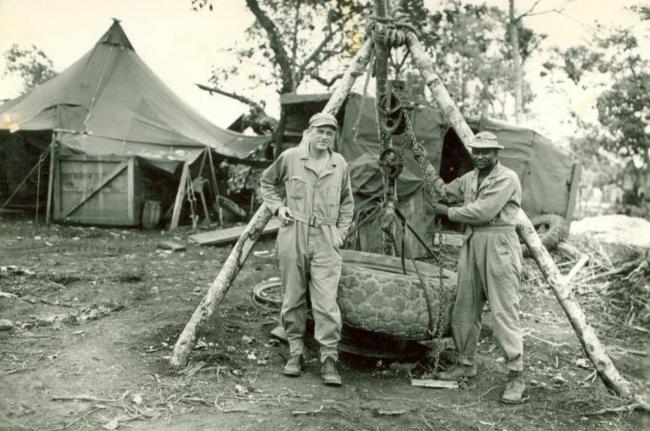
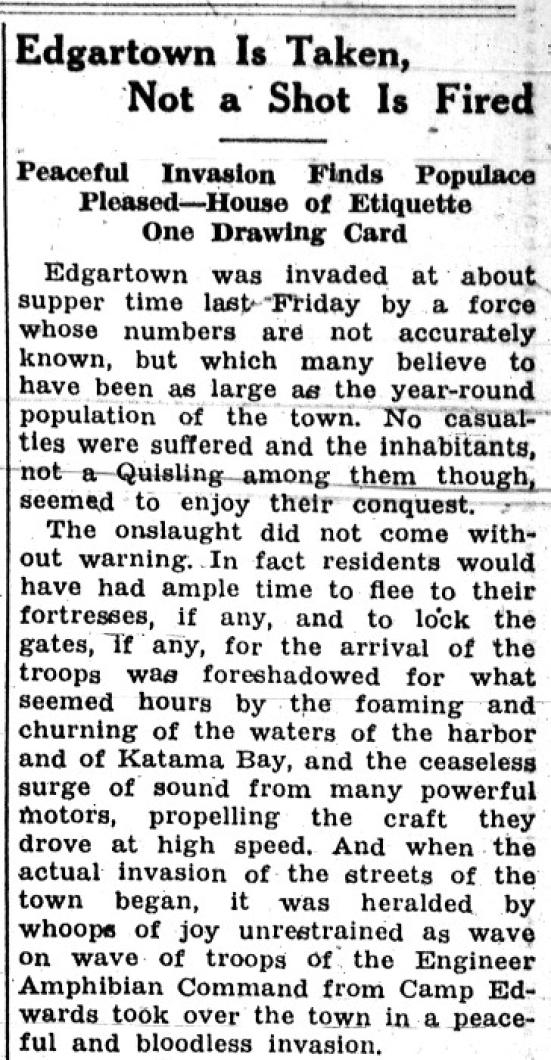



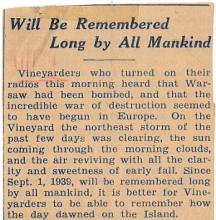
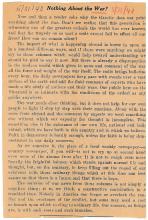

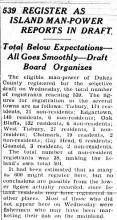

Comments